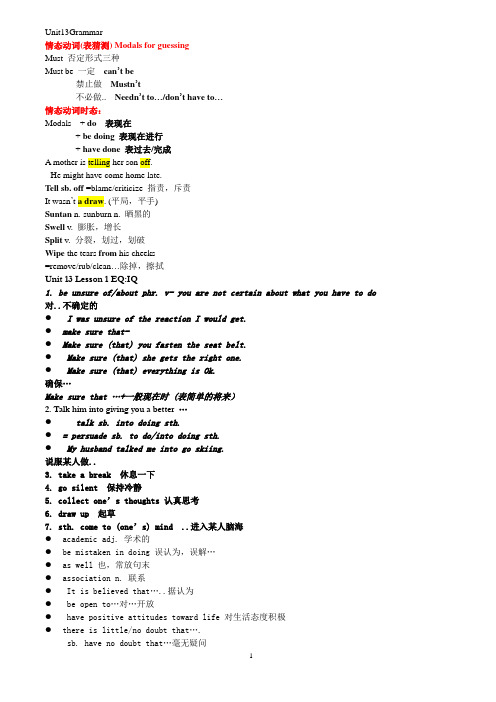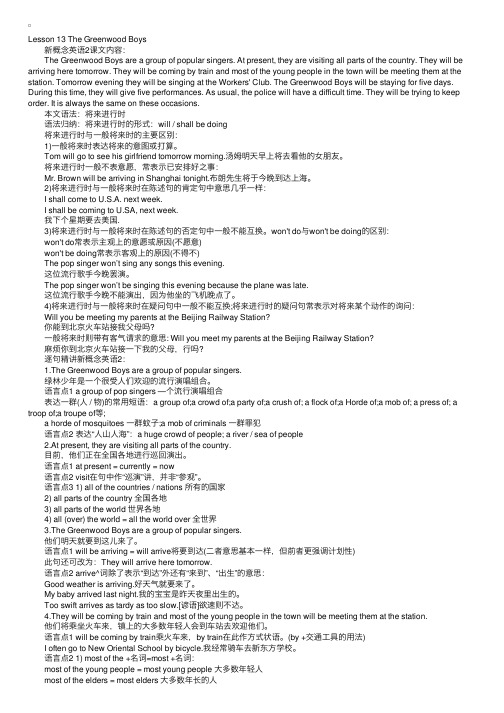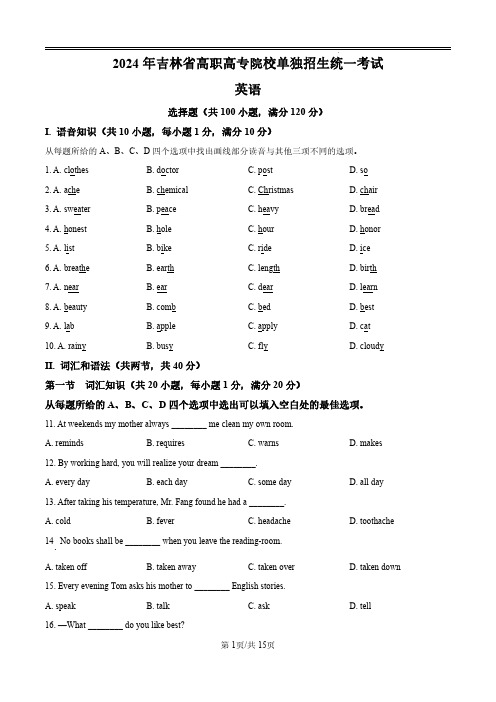高职高专英语语法 第13章句子
高职高专英语语法及练习

Grammar one一般时态的一些特殊用法Task1Study the following grammar tips for simple tenses and match them with the sentences in the column on the right.1.状语从句中,一般现在时 A. The flight for Shanghai leaves表示将来. at 8:30 tomorrow morning.2.瞬间性动词的一般现在时 B. Your job description clearly表示将来行为发生的计划 tells you your role within your性和规划性。
family.3.一般现在时可用于新闻标 C. George Bush Holds Talks with题、使用指南等说明文体。
Tony Blair.4. 一般过去时用来表示某种 D. Who told you this!感情色彩。
E. I’ll tell him about it if hecomes tomorrow.Task 2Complete the following sentences using proper form of the given verbs.1.–Mom, I have cut my finger.-You_______(ask) for it!2. American delegation _______(leave)Beijing for Shenzhen this afternoon.3. I will give it to her as she_______(come) bake to the office.4. The book______(aim) at teaching freshmen how to read faster.5. Train Accident______(kill) 23 People (News Headline)Task 3Translate the following into English.1.图书馆晚上10点闭馆。
Unit13Grammar讲解

Unit13Grammar-情态动词(表猜测) Modals for guessingMust 否定形式三种Must be 一定---can’t be禁止做---Mustn’t不必做..---Needn’t to…/don’t have to…情态动词时态:Modals + do 表现在+ be doing 表现在进行+ have done 表过去/完成A mother is telling her son off.--He might have come home late.Tell sb. off =blame/criticize 指责,斥责It wasn’t a draw. (平局,平手)Suntan n.-sunburn n. 晒黑的Swell v. 膨胀,增长Split v. 分裂,划过,划破Wipe the tears from his cheeks=remove/rub/clean…除掉,擦拭Unit 13 Lesson 1 EQ:IQ1. be unsure of/about phr. v- you are not certain about what you have to do 对..不确定的● I was unsure of the reaction I would get.●make sure that-●Make sure (that) you fasten the seat belt.● Make sure (that) she gets the right one.● Make sure (that) everything is Ok.确保…Make sure that …+一般现在时 (表简单的将来)2. Talk him into giving you a better …● talk sb. into doing sth.●= persuade sb. to do/into doing sth.● My husband talked me into go skiing.说服某人做..3. take a break 休息一下4. go silent 保持冷静5. collect one’s thoughts 认真思考6. draw up 起草7. sth. come to (one’s) mind ..进入某人脑海●academic adj. 学术的●be mistaken in doing 误认为,误解…●as well 也,常放句末●association n. 联系● It is believed that…..据认为● be open to…对…开放● have positive attitudes toward life 对生活态度积极●there is little/no doubt that….sb. have no doubt that…毫无疑问● have problems/a hard time/trouble doing…在…有困难● be determined by…由…决定● have a lot to do with..与…有关● in terms of…在…方面,就…而言● recognize…as 认为…● afterwards adv. 不久后,稍后,后来● obvious adj. 清楚的,明显的● as+形容词原级, if not +形容词比较级+than●“即使不比….,但至少和….一样”● react to…对…作出反应be accused of…被控告…..Unit 13 Lesson 2Personalities and jobsSharp adj.思维敏捷的a sharp minda sharp increase in pricesa sharp voicea sharp pain in my back迅速的尖锐的,响的突然的,严重的Transcript P119biology n. 生物学aboard prep./adv. 上(船,飞机,汽车)Make hay while the sun shines抓住时机make the best of sth 充分利用assistant n. (helps others in their work) 助手back-up adj. 候补的,备用的Unit 13 lesson 3Making Guesses about PeopleKeys:●frightened●separated●fallen●freezing●sheltering●some food●worried1. Shelter v.—to provide a place where sb. can be protected.遮蔽,保护●shelter…from.. (vt.)●Trees shelter the house from the wind.●shelter from (vi.)●We sat in the shade, sheltering from the sun.2. missing students=lost students3. She had tears running down…e.g. I had the air-conditioner running.You shouldn’t have yourself watching TV all-day.4. fault [CN] (responsible for mistakes)find fault with sb. phr.ve.g. She is always finding fault with me, either in my study or in my personality. 过错,过失5. A broken arm (get injured)the broken marriagethe broken Englishthe broken sleep6. relief [UN] (a feeling comfort)e.g. No one was hurt, and we all breathed a sigh of relief .relieve v.e.g. Drugs helped to relieve the pain.Programs aimed at relieving unemployment.慰藉(痛苦,负担)减轻;解除Unit 13 Lesson 4---First Impressions● 1. full of anxiety [UN] (a feeling of worried about sth.)●There is growing public anxiety over levels of air pollution in our cities.●The fear of unemployment can be a source of deep anxiety to people.● 2. do some revision [UN]●①the process of learning work for the exam)●②the process of changing sth. to improve it by correcting it or including new information or ideas) ● 3. glare at --phr. v (look angrily)忧虑,焦虑复习修订,修正怒视文学● 4. English literature (n.) section● a literary (adj.) type● 5. If anything…如果有的话,如果有区别的话●Sam didn‘t seem too disappointed at losing. If anything, he seemed relieved that it was all over.●There is nothing left in the old building, if anything, it would be rubbish.● 6. steam comes out of one’s ears●7. leave …behind文艺的气到耳朵冒烟遗漏,落下8. It was only when I got home two hours later that I realized I’d forgotten it. 强调句9. confirm v.e.g. These new studies confirm our worst fears about the economic depression.Please write to confirm your reservation.10 . bring…around phr. v11. sigh with relief12. guilty adj. (ashamed) 心虚的,羞愧的确认,证实带过来松了一口气对…过敏的;极讨厌某事13. be allergic to sth.e.g. He is allergic to nuts/pollen.Most men are allergic to housework.Unit 14Lesson 1Your ChoiceV ocabulary Building1. have problem (in) doing sth. 做某事有困难I have some problems (in) learning English well.have trouble (in) doing sth. 在... 有麻烦have difficulty (in) doing sth. 做... 有困难2. plot n. -- (events in a story or a movie)情节summary n. -- (the main information about sth.without giving all the details)概要3. guidance n. -- (help or advice)指导,引导4. model n. -- (sb. or sth. people want to copy because they are successful or have good qualities)e.g. A model paragraph/essay/compositionGood teachers can act as positive models.5. timetable n. -- (schedule)e.g. railway/bus/train/flight timetableThe first lesson on the timetable for Monday morning is English.6. institute n. -- (an organization that has a particular purpose)范文模范时刻表课程表学院;机构;协会,7. aid n.They've made an urgent request for international aid.I hope this book will be a great aid to English composition.援助; 帮助give/offer aid to…phr.v提供帮助8. data n. -- (information or facts)数据,资料9. set an exampleShe arrive at the office early to set an example to the others.树立榜样,作为典型8. charge n.take charge of phr. v. -- (take control of a situation, organization or a group of people)e.g. Owen came back and took charge of the situation.in charge (of sth.) phr. v. --(have the responsibility)e.g. The officer was in charge of the investigationHe asked to speak to the person in charge.①控制②负责, 掌管●error n. (mistake)●receipt n. (a piece of paper that you are given which shows that you have paid for sth.)● e.g. Keep your receipt in case you want to bring it back.●consult v. (to ask for information or advice from someone because it is their job to know sth.) 收据咨询,向..请教●●quarrel with sb. (argue with)●casual clothes adj. (informal)●chart n. (table/form)●storm off phr.v. (leave angrily)●blow up phr.v. (destroy sth.by exploding)●come/go to one’s aid (help sb.)Unit 14 Lesson 2Interviews1. put on(1). 穿上,戴上Take off your overcoat and put on your raincoat.(2). 上演,演出They put on a concert to welcome the guests.(3). 增加体重I has put on weight during the last month.2. go out(1). 出去The peasants went out early to get in the wheat.(2).(灯,火)熄灭Suddenly all the lights went out.(3). 过时,不流行Flared trousers went out years ago.3. write down 记下,写下He wrote down what the teacher had written on the blackboard.Write down the address before you forget it.4. find out 发现,查明,弄清She finally found out that he was a liar.They found out who let the spy go.5. turn up(1). 出现,到达She turned up late for the meeting yesterday.(2). 发生Something unexpected has turned up.(3). 调高音量6. take down(1). 记下,写下The reporters carefully took down the speech.(2). 取下,拆除Please take down the old picture.7. make up(1). 编造,编写The teacher asked us each to make up a story.(2). 组成,构成Oxygen makes up about a fifth of the atmosphere.(3)弥补,补偿We must make up his economic losses.(4)化妆(5)与….和好Have you made up with Patty yet?8. make out(1). 看出,分辨出I see something in the distance, but can’t make it out.(2) 理解,了解I couldn’t make out what he meant.(3) 开列,填写Please make out a bill for these books.9. go intoWhen I went into the classroom, I saw my classmates already in their places.进入We must go into the matter further before making a decision. 调查10. speak up 响亮地说,公开地说出,大声讲The speaker was told to speak up as they couldn’t hear him clearly.If you do know the answer, speak up so everyone can hear you.Ex.2 Complete Mandy’s accout of an interview with verbs above.New Words1. frost n. 霜The frost killed the young tomato plants.2. surrounding adj. 附近的;周围的The surrounding villages have been absorbed into the growing city.3. steep adj. 陡峭的They climbed the steep mountain inch by inch.4. grain n. 谷物Farmers grow grain and keep cattle.5. wisdom n.智慧,明智He is a man of great wisdom.5. The grass is always greener on the other side.这山望着那山高。
语文版中职英语基础模块上册7-12单元必背语法(含短语与句型)

语文版中职英语基础模块上册7-12单元必背语法(含短语与句型)基础模块上册 Unit 7 必背语法1.(现在)分词作状语:我在机场等去巴黎的飞机票。
2.基本句型四:主语+谓语动词+间接宾语+直接宾语(主谓宾宾):3.时间和条件状语从句中常用一般现在时表示将来。
1)If your computer is not working, just write out aticket. 2)So if the computer doesn’t work, you don’t work either. 4.被动语态:But only the computer is allowed to do so.5.6.主语从句:It is clear that the trouble doesn’t come from the computer but the person who workds on it.(形式主语、真正主语)基础模块上册 Unit 8 必背语法1.agree with 同意某人(所说的) agree on 就...取得一致意见agree to 同意(某计划、建议或安排等) agree to do sth 同意做某事2.几大从句: 1)the idea that life is fair 生活是公平的这个观点同位语从句:对名词进一步解释,说明名词的具体内容;定语从句:对名词进行限定能接同位语从句的名词:idea 想法, fact 事实, news 消息,suggestion 建议, 等等注意与定语从句的区别:the idea that he put forward 他提出的这个观点2)定语从句:...something a teacher said 一个老师说过的某件事...children who are out of school. 失学的儿童3)(时间)状语从句:...when I was a high school student. When we say that life isn’t fair,we mean... Wh en he was 13 years old,he broke his neck. He isn’t a failure until he begins to blamesomebodyelse. 4)宾语从句:We usually think that life should be fair. When we say that life isn’t fair,we mean everyone isdifferent. He knew that a good education was his only way tosuccess. 5)表语从句:Life is what we make.3.a friend of mine 我的一个朋友4.in fact 实际上5.remind sb. of sb./sth. 提醒某人...,使某人想起...6.be full of 充满→be filled with 充满7.系动词+表语:1)feel sorry for 为...感到不幸/可怜/难过/遗憾/惋惜2)look different 看起来不同 3)become successful 8.experience 经验、经历:不可数名词、可数名词 difficulty 困难、难事:不可数名词、可数名词9.expect sb. to do sth. 期待某人做某事(不定式作宾补)expect to do sth. 期待做某事(不定式作宾语)10.what we make/do/say 我们所创造的/做的/说的what it used to be 过去(所表现)的样子 11.13 years old:13 岁(year 后加 s)13-year-old:13 岁的(year 后不加 s) 12.since+时间:自从...,前面常用现在完成时 13.give up+doing:放弃做... 14.go on to do:继续做另一件事go on doing:继续做原来做的事 go on with:继续做原来做的事 15.fail to do:未能做 16.begin doing/to do:开始做 17.the only:唯一的 18.out of school/work/job/business:失学/失业/失业/停业19.blame s b. for sth. →blame sth. on sb. 把某事归咎于某人20.not...until... 直到...才...,引导时间状语从句 until 直到...(为止),引导时间状语从句基础模块上册 Unit 9 必背语法1.a little+可数名词(单数):一个小的... a little +不可数名词:一点..., 表肯定; a few+可数名词:一些, 表肯定little+不可数名词: 很少,几乎没有,表否定;few+可数名词: 很少,几乎没有,表否定 2.keep (co ntrol, lose) one’s temper 不发(控制自己的、发) 脾气have a good (bad, quick, slow) temper 脾气好(脾气不好, 急性子,慢性子)good-tempered 脾气好的;bad-tempered 脾气不好的 3.fight with,have a fight with 与...打架/战斗/斗争/争辩fight for 努力争取,为...而斗争 fight against 反对,与...作斗争4.every/each time... 每次; 每当...的时候【后接时间状语从句, 常用现在时表示将来】5.once 从前,曾经,一次;一旦...就...【后接时间状语从句,常用现在时表示将来】 6.tell (ask,allow,get) sb. to do sth. 不定式作宾补(不省 to) make/let/have/see/hear/watch sb. do sth. 不定式作宾补 (省略 to 但被动语态中不省) 7.tell about 讲述; tell of 谈及 tell sb. sth.告诉某人某事【接双宾语】; tell sb. about sth. 告诉某人关于... tell sb. to do sth. 告诉某人做某事【接宾语+宾语补足语,不定式作宾补】 8.the number of... ...的数量【后接可数名词复数+单数谓语动词】 a number of... 许多...[后接可数名词复数+复数谓语动词】 9.not...at all 一点也不, 根本不; not at all 别客气, 不用谢 after all 毕竟; in all 总共, 合计;all in all 总的来说 10.be gone 用完,不在/见了have gone to 已经去了...【在去的路上】 have been to 已经去过... 【已经回来】 11.take sb. by the hand 抓住某人的手 hit sb. on the head/in the face/in the stomach 打某人的头/脸/肚子12.do well (in), do a good job (in):(在...方面)做得好/干得出色13.the same as+名词/代词/动名词:与...同样的 just like/as 正如,就像...一样14.in/with anger、angrily 愤怒地 15.word:单词;话语;消息(单数,常不用冠词) 16.even if/though 即使, 引导让步状语从句only if 只有...才..., 引导条件状语从句, 主句中用倒装结构 if only 要是...就好了, 但愿if 如果, 是否, 引导条件状语从句或宾语从句(al)though 虽然, 尽管, 引导让步状语从句 17.get on/along (well/bad) with 与...相处(得好/不好)基础模块上册 Unit 10 必背语法1.want to do 想(要)做 want doing=want to be done 需要做want sb. to do 想要某人做I don’t want to. 回答时省略不定式中的动词2.between...and... 在...与...之间【两者之间】,注意among!3.with great joy 非常高兴地to sb.’s great joy/surprise/excitement 使某人非常高兴/ 吃惊/兴奋的是【常放句首】 4.be good at (doing) 善于(做)be good for 对...有好处 be good to 对...好 do good to 对...有好处 do a good job 干得好It’s good for sb. to do... 做...对某人有好处It’s good of sb. to do... 某人做...真好【形容人的特征用 of】5.news:不可数名词,注意后面接同位语从句与定语从句的区别6.be eager to do 渴望做7.get to 到达,arrive in/at 到达,reach 到达8.as...as possible → as...as sb. can;as soon as 一...就...9.without (如果)没有,后接动词时要用动名词,常表伴随、假设with 有,随着 10.tiring 累人的,exhausting 令人筋疲力尽的tired 累的,exhausted 筋疲力尽的 11.keep doing 继续做keep on doing 继续/反复地做 keep from doing 忍住不做 keep sb. from doing 阻止某人做keep sb./sth. doing 使...持续不停地做12.not...any more → no more 不再not...any longer → no longer 不再 13.two thousand 两千,thousands of 几千:表确切数目时不加 s,表不确切数目时要加 s 14.the Olympic Games 奥运会:作主语时谓语动词要用复数15.be held in/at 在...举行【注意被动语态】16.at the end of 在...结尾 in the end 最后 by the end of 到...为止【常与完成时搭配】 17.look for 寻找 look after 照顾→ take care of 照顾 look up 向上看,查(词典)look at 看 /doc/f416368074.html,e up with 提出,come up 被提出;上来,走到跟前19.every four years →every fourth year 每隔三年/每四年 20.so/such...that... 如此...以致...;such...as... 像...那样的...(just) as...正如...;the same as...与...相同;so as to 以便 21.not all.../all...not...:并不是所有的...都...【部分否定】22.by doing 通过做... 23.The important thing is not winning but taking part. 动名词作表语 24.keep fit/healthy 保持健康基础模块上册 Unit 11 必背语法1.make friends with 与...交朋友 friend 朋友;friendly 友好的;friendship 友谊2.play an (important,active) part/role in... 在...方面起(重要的、积极的)作用 take (an active) part in (积极)参加3.get on/along (well ) with 与...相处和睦 get on/along 进展4.a number of 许多→ many;a lot of;lots of the number of ...的数量5.不定代词修饰可数名词:few 很少;a few 一些;many 许多;some 一些修饰不可数名词:little 很少;a little 一点;much 许多6.since childhood 自幼,打小,自从孩童时期【since 常与完成时搭配】7.recently 最近→ recent 最近的 8.such as,for example:例如9.for a long time:for + 一段时间【常与现在完成时连用】10.share...with... 与...共用/分享... 11.rely on/upon 依赖,信任depend on/upon 依靠 12.be willing to do 愿意做 13.too much 过分,非...力所能及,太多(的)【后接不可数名词】too many 太多的【后接可数名词】much too 太,非常【后接形容词】 14.expect to do:期待做【不定式作宾语】 expect sb. to do:期待某人做【不定式作宾补】 15.in front of 在...的前面【指外面的前面】 in the front of 在...的前面【指里面的前面】 16.beside 在...旁边; besides 除了...外还...; except/but 除了...外17.be/get angry with sb. 生某人的气 18.祈使句变反意疑问句:Be my friend, will you? Let’s 开头用 shall we; Let us 开头视情况用 will you 或 shall we基础模块上册 Unit 12 必背语法1.be coming 将要来 come,go,leave,arrive,return 等表移动方向的动词的进行时态常表将来:He is leaving next week.他下周离开。
新概念英语第二册Lesson 13 语法

Lesson 13 语法将来进行时一、将来进行时的构成将来进行时是由"shall/will + be + 现在分词"构成的。
例如:Don't phone me between 8:00 and 10:00. We'll be having classes then.8点到10点之间不要给我打电话,我们那时正在上课。
Will you be using your bicycle this evening?今晚你用自行车吗?She won't be having a meeting in her office at 8:00 tomorrow.明天8点她不在办公室开会。
二、将来进行时的用法①将来进行时的基本用法: 表示在将来某一时间正在进行的动作。
例如:I'll be taking my holiday soon. 我不久就去度假了。
They will be meeting us at the station. 他们会在车站接我们的。
另外,这一时态在口语中也可代替will/shall do。
②将来进行时的特殊用法★A表示原因、结果或猜测。
例如:Please come tomorrow afternoon, Tomorrow morning I'll be having a meeting.请你明天下午来吧。
我明天上午有个会。
(表原因)Stop the child or he will be falling over. 抓住那个孩子,要不他会掉下去的。
(表结果)Y ou will be making a mistake. 你会出错的。
(表推测)★B. 用在问句中,表示委婉礼貌。
Will you be reading anything else?你还要看点儿什么吗?When shall we be meeting again?我们什么时候再见面?★★★C. 表示稍后一点儿的安排。
高职高专英语语法

Ⅰ、时态一、现在完成时和现在进行完成时1.现在完成时*这个时态常和just、already、yet这类词连用,表示刚发生的事。
如:1)I’ve just had my lunch. 我刚吃过午饭。
2)I haven’t received your letter yet. 我还没收到你的来信。
*另外,这个时态还常与诸如often、ever、always、seldom、regularly、never、today、in the past two years、for the last few years、up to now、before、so far、from time to time、before now这类表示时间的状语搭配使用。
如:1)I’ve often heard her sing this song.我常常听见她唱这支歌。
2)She has attended classes regularly.她经常按时上课。
3)She hasn’t appeared on TV before now.这之前她没上过电视。
4)He has lived here for the past few years.最近几年,他一直住在这儿。
5)So far there has been no bad news.到目前为止,还没有什么坏消息。
*和for、since、how long搭配的现在完成时态。
如:1)I’ve known her for a long time. 我认识他很长时间了。
2)Tom hasn’t been home since he was a boy.汤姆从小离家就没回去过。
3)How long have you had the car?这车你们用多久。
1。
现在完成进行时(表示由过去某时一直持续的动作,这动作可能刚刚停止,也可能还在进行)*用这个时态时常常有一个表示现在之前这段时间的状语,如:all day、for some years、since、recently、this week等。
逐句精讲新概念英语第二册:第十三课绿林少年

Lesson 13 The Greenwood Boys 新概念英语2课⽂内容: The Greenwood Boys are a group of popular singers. At present, they are visiting all parts of the country. They will be arriving here tomorrow. They will be coming by train and most of the young people in the town will be meeting them at the station. Tomorrow evening they will be singing at the Workers' Club. The Greenwood Boys will be staying for five days. During this time, they will give five performances. As usual, the police will have a difficult time. They will be trying to keep order. It is always the same on these occasions. 本⽂语法:将来进⾏时 语法归纳:将来进⾏时的形式:will / shall be doing 将来进⾏时与⼀般将来时的主要区别: 1)⼀般将来时表达将来的意图或打算。
Tom will go to see his girlfriend tomorrow morning.汤姆明天早上将去看他的⼥朋友。
将来进⾏时⼀般不表意愿,常表⽰已安排好之事: Mr. Brown will be arriving in Shanghai tonight.布朗先⽣将于今晚到达上海。
2024年吉林省高职高专单招考试英语卷试题真题(含答案)

2024年吉林省高职高专院校单独招生统一考试英语选择题(共100小题,满分120分)Ⅰ.语音知识(共10小题,每小题1分,满分10分)从每题所给的A、B、C、D四个选项中找出画线部分读音与其他三项不同的选项。
1.A.clothes B.doctor C.post D.so2.A.ache B.chemical C.Christmas D.chair3.A.sweater B.peace C.heavy D.bread4.A.honest B.hole C.hour D.honor5.A.list B.bike C.ride D.ice6.A.breathe B.earth C.length D.birth7.A.near B.ear C.dear D.learn8.A.beauty b C.bed D.bestb B.apple C.apply D.cat10.A.rainy B.busy C.fly D.cloudy Ⅱ.词汇和语法(共两节,共40分)第一节词汇知识(共20小题,每小题1分,满分20分)从每题所给的A、B、C、D四个选项中选出可以填入空白处的最佳选项。
11.At weekends my mother always________me clean my own room.A.remindsB.requiresC.warnsD.makes12.By working hard,you will realize your dream________.A.every dayB.each dayC.some dayD.all day13.After taking his temperature,Mr.Fang found he had a________.A.coldB.feverC.headacheD.toothache14.No books shall be________when you leave the reading-room.A.taken offB.taken awayC.taken overD.taken down15.Every evening Tom asks his mother to________English stories.A.speakB.talkC.askD.tell16.—What________do you like best?—Red.A.subjectB.animalC.colorD.city17.I am________seeing you next week,when I will share something funny with you.A.looking forward toB.looking on asC.looking forD.looking around18.As a result of his efforts,he is making rapid________in college.A.troubleB.a promiseC.mistakesD.progress19.Standing under our national flag,I have a strong sense of________.A.serviceB.prideC.directionD.relaxation20.Lily could always find something good in her life,________she sometimes met with difficulties.A.untilB.thoughC.becauseD.till21.We have been trying our best to keep the________of nature.A.balanceB.wayC.methodD.rule22.If you need any help,________call me.A.silentlyB.heavilyC.directlyD.easily23.Every time he lost heart,the headmaster would________him to try again.A.likeB.encourageC.needD.let24.Xi’an is famous________its old city wall.A.inB.toC.asD.for25.A thousand-mile journey begins________the first step.A.toB.forC.withD.out26.The Selected Readings from Xi Jinping’s Works was________in the middle of March of2024.And soon it will be on sale in bookstores.A.readB.publishedC.writtenD.sold27.—May I borrow your iPad?—________.After all,we are close friends.A.I’m sorryB.Go aheadC.Of course notD.You’d better not28.Children are curious________everything around.A.inB.forC.atD.about29.He tried many times and achieved his goal________.A.on endB.by the end ofC.at the end ofD.in the end30.We are proud to live in a country________peace and love.A.full ofB.familiar withC.good atD.similar to第二节语法知识(共20小题,每小题1分,满分20分)从每题所给的A、B、C、D四个选项中选出可以填入空白处的最佳选项。
中职计算机专业英语教学课件Lesson 13 PowerPoint

Notes
2.扩展词汇。 computer aided 计算机辅助的 CAD (Computer Aided Design) 计算机辅助设计 microfilm 缩微胶片 art gallery 微软图形库 image scanner 图像扫描器 default 缺省,默认 index 索引 datatype 数据类型 field 字段
17
Reading Comprehension
To many, electronic commerce is defined as the buying and selling of products and services over the Internet, but there are many more aspects. From its inception, electronic commerce had included the handling of purchase transactions and fund transfers over computer networks. It’s grown now to include the buying and selling of new commodities such as electronic information.
3
Lesson 13 PowerPoint
Microsoft PowerPoint allows you to create dynamic presentation easily that include multimedia features such as sounds, movies and images. As a matter of fact, it shares some basic commands and capabilities as those found in Microsoft Word and Excel which we have mentioned before. Obviously, it is relatively easy to learn the basics of Microsoft PowerPoint. First, click the Start Button on the Windows taskbar and select the item “Program” then click “PowerPoint”.
- 1、下载文档前请自行甄别文档内容的完整性,平台不提供额外的编辑、内容补充、找答案等附加服务。
- 2、"仅部分预览"的文档,不可在线预览部分如存在完整性等问题,可反馈申请退款(可完整预览的文档不适用该条件!)。
- 3、如文档侵犯您的权益,请联系客服反馈,我们会尽快为您处理(人工客服工作时间:9:00-18:30)。
第1节句子按使用目的分类 节句子按使用目的分类
b.当must +be doing表示对现在进行时的推测时,反意疑问句部分用 当 表示对现在进行时的推测时, 表示对现在进行时的推测时 反意疑问句部分用be 的形式 It's so quiet. They must be sleeping,aren't they? , c. must + have done+一般过去时的时间状语,表示对过去的推测,反 一般过去时的时间状语, 一般过去时的时间状语 表示对过去的推测, 意疑问句部分用did 意疑问句部分用 d. must+ have done+现在完成时的时间状语,表示对完成时的推测, 现在完成时的时间状语, 现在完成时的时间状语 表示对完成时的推测, 反意疑问句部分用have,has. 反意疑问句部分用 , .
第13章句子 章句子
第1节句子按使用目的分类 节句子按使用目的分类 第2节句子按结构分类 节句子按结构分类
第1节句子按使用目的分类 节句子按使用目的分类
一,陈述句
就事物依照其实在情形陈述的句子叫做陈述句. 就事物依照其实在情形陈述的句子叫做陈述句.陈述句的句 末必须使用句号(Full Stop)以示句子的陈述结束.陈述句分为肯定 以示句子的陈述结束. 末必须使用句号 以示句子的陈述结束 句和否定句,其基本结构为:主语 谓语+其他 主语+谓语 其他. 句和否定句,其基本结构为 主语 谓语 其他. The sun rises in the east and sets in the west. The students are reading attentively. What they want is not money. The problem is not who will go for me. They are building a new apartment for the students.
上一页 下一页 返回
第1节句子按使用目的分类 节句子按使用目的分类
2.特殊疑问句 特殊疑问句 以疑问词开头,对句中某一成分提问的句子叫特殊疑问句. 以疑问词开头,对句中某一成分提问的句子叫特殊疑问句. 常用的特殊疑问词有:what , who,whose,which,when,where, 常用的特殊疑问词有 , , , , , how,how many,how much,how old,how soon,how often, , , , , , , why等.特殊疑问句一般读降调. 等 特殊疑问句一般读降调. 特殊疑问句有以下两种语序. 特殊疑问句有以下两种语序. (1)如疑问词作主语或主语的定语,即对主语或主语的定语提问,其语 如疑问词作主语或主语的定语, 如疑问词作主语或主语的定语 即对主语或主语的定语提问, 序是陈述句的语序:疑问词 主语)+谓语动词 疑问词(+主语 谓语动词+其他成分 序是陈述句的语序 疑问词 主语 谓语动词 其他成分 Who are reading in the room (2)如疑问词作其他成分,即对其他成分提问,其语序是 疑问词 一般 如疑问词作其他成分, 疑问词+一般 如疑问词作其他成分 即对其他成分提问,其语序是:疑问词 疑问句语序 What class do you like best?
下一页
返回
第1节句子按使用目的分类 节句子按使用目的分类
二,疑问句
1.一般疑问句 一般疑问句 一般疑问句用yes/no来回答,相当于汉语中的"……吗?",一般疑问 来回答, 一般疑问句用 来回答 相当于汉语中的" 吗 , 句 一般读升调. 一般读升调. 构成:系动词 助动词/情态动词 主语+其他成分 系动词be/助动词 情态动词+主语 构成 系动词 助动词 情态动词 主语 其他成分 -Are you a teacher? -Yes,I am. /No,I'm not. , , 一般疑问句有时不用yes或 回答 一般疑问句有时不用 或no回答 -May I have supper now? -Certainly.
上一页
上一页
下一页
返回
第1节句子按使用目的分类 节句子按使用目的分类
(7)当陈述句部分有 当陈述句部分有hardly , scarcely , barely , rarely , seldom ,few ,little , 当陈述句部分有 no , never , nothing, nobody , nowhere等否定词或半否定意义的词 等否定词或半否定意义的词 反意疑问句部分要用肯定形式. 时,反意疑问句部分要用肯定形式. He never likes to help others,does he'? , He can find his English book nowhere,can he? nowhere, 但是如果陈述句部分是带有否定前缀或后缀时, 但是如果陈述句部分是带有否定前缀或后缀时,则反意疑问 句部分仍用否定结构 It's impolite to interrupt other's talking,isn't it? ,
上一页
下一页
返回
第1节句子按使用目的分类 节句子按使用目的分类
4.反意疑问句 反意疑问句 反意疑问句又叫附加疑问句, 反意疑问句又叫附加疑问句,是指当提问的人对前面所叙 述的事实不敢肯定,而需要向对方加以证实时所提出的问句. 述的事实不敢肯定,而需要向对方加以证实时所提出的问句.构 陈述句+反意疑问句 成:陈述句 反意疑问句.陈述部分用肯定语气,反意部分则用否 陈述句 反意疑问句.陈述部分用肯定语气, 定语气;而陈述部分用否定语气 则反意部分用肯定语气. 而陈述部分用否定语气, 定语气 而陈述部分用否定语气,则反意部分用肯定语气.用yes或 或 no回答. 回答. 回答 -He likes reading , doesn't he?他喜欢阅读,不是吗 他喜欢阅读, 他喜欢阅读 不是吗? -Yes, he does.是的,他喜欢./-No , he doesn't.不,他不喜欢 是的, 是的 他喜欢. 不 (1)陈述句部分的主语是名词时,反意疑问句的主语必须用人称代词来 陈述句部分的主语是名词时, 陈述句部分的主语是名词时 代替. 代替. The workers are working hard,aren't they? ,
上一页
下一页
返回
第1节句子按使用目的分类 节句子按使用目的分类
(2)当陈述句的主语是指示代词 当陈述句的主语是指示代词this , that时,反意疑问句的主语用 代 当陈述句的主语是指示代词 时 反意疑问句的主语用it代 指示代词是these , those时,反意疑问句的主语用 代替. 替;指示代词是 指示代词是 时 反意疑问句的主语用they代替. 代替 (3)当陈述句部分是 am…时,反意疑问句部分通常要用 当陈述句部分是I 当陈述句部分是 时 反意疑问句部分通常要用aren't I;如陈 如陈 述句部分的主语是I 述句部分的主语是 am not时,反意疑问句部分通常要用 时 反意疑问句部分通常要用am I (4)当陈述部分是 (4)当陈述部分是everyone/everybody, someone/somebody no 当陈述部分是everyone/everybody, one/nobody/none等表示人的不定代词时,反意疑问句部分的主语 等表示人的不定代词时, 等表示人的不定代词时 多用they,但也可用 当陈述句部分的主语是 当陈述句部分的主语是everything , 多用 ,但也可用he;当陈述句部分的主语是 anything , something , nothing等表示物的不定代词时,反意疑问 等表示物的不定代词时, 等表示物的不定代词时 句部分的主语用It 句部分的主语用 (5)当陈述句部分是"there be"结构时,反意疑问句部分要重复使用 当陈述句部分是" 结构时, 当陈述句部分是 结构时 there There are some new words for you to remember, aren't there'?
上一页
下一页
返回
第1节句子按使用目的分类 节句子按使用目的分类
(8)动词不定式 短语 ,动名词 短语 以及主语从句作陈述句部分的主 动词不定式(短语 动名词(短语 短语)以及主语从句作陈述句部分的主 动词不定式 短语), 语时,反意疑问句部分用it 语时,反意疑问句部分用 To grasp a foreign language is difficult,isn't it? , (9)当陈述句部分有情态动词 当陈述句部分有情态动词must时,反意疑问句部分有以下 种情况. 种情况. 当陈述句部分有情态动词 时 反意疑问句部分有以下4种情况 表示" 反意疑问句部分用must ( mustn't ). ①must表示"必须,禁止"时,反意疑问句部分用 表示 必须,禁止" . ② must表示"有必要"时,反意疑问句部分要用needn't 表示"有必要" 反意疑问句部分要用 表示 They must finish the work today,needn't they? , 表示推测时: ③must表示推测时 表示推测时 a.当must + do/be表示对现在的情况进行"推测"时,反意疑问句部分 表示对现在的情况进行" 当 表示对现在的情况进行 推测" 要 根据must后面的动词采用相应的形式 根据 后面的动词采用相应的形式 He must be in the room,isn't he? ,
上一页
下一页
返回
第1节句子按使用目的分类 节句子按使用目的分类
